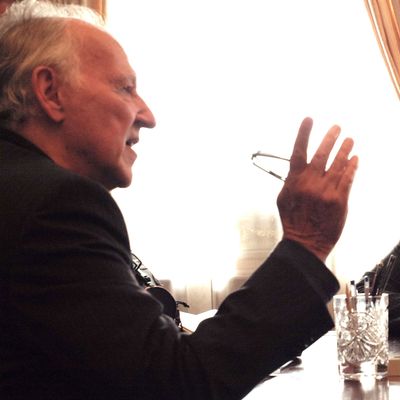
Sometimes, a history lesson works better when it’s a little ragged and personal. Clocking in at a little over 90 minutes and consisting primarily of a sit-down interview with the former Soviet leader, Werner Herzog’s Meeting Gorbachev speeds through a vast stretch of the 20th century, explaining the decline of the Soviet Union and the Iron Curtain through the eyes of the man whose reforms precipitated much of it. But Herzog himself brings a surprising — and, it turns out, necessary — element to their interactions: that of the grateful world citizen, one of billions who felt the first pangs of existential relief when Gorbachev brought a new openness to the USSR and began talking nuclear disarmament with President Ronald Reagan. Meeting Gorbachev is a hagiography, but it’s unafraid to position itself as such; Herzog makes his case proudly and passionately.
The director opens by first apologizing to the former Soviet leader for the crimes committed by Germans against Russians during World War II. “I am a German, and the first German you ever met probably wanted to kill you,” he suggests. Gorbachev counters that his childhood neighbors in the Northern Caucus town of Privolnoye were a family of Germans who owned a sweet shop, and that he was fond of them as a result. “I thought that such wonderful sweets could only be made by good people,” he recalls thinking.
This establishes the personal quality of the film’s approach. We feel that we’re watching two humans reflecting on Earth-shattering historical events, not just an interviewer and his subject trading questions and answers. They proceed quickly through the highlights of Gorbachev’s life and career — including his rise as a local party boss with a gift for agricultural planning, and his meeting and marrying fellow student Raisa Titarenko, who was just as headstrong as he was. An extended riff on their marriage is saved for the end, when Herzog does his best Barbara Walters impersonation and goes for the kill, repeatedly asking Gorbachev about his late wife: “Do you remember her voice, her laughter, her smell, the perfume?” he asks. “How much do you miss her?” Gorbachev doesn’t let him down: “When she died, my life was taken from me,” he replies tearfully.
To those of us who still remember some of the key events of Gorbachev’s rise and eventual fall — the musical chairs of dying leaders that preceded him; his first summit with Reagan in Reykjavik, Iceland; the Chernobyl nuclear disaster; the desperate coup by hardliners that hastened the USSR’s collapse — Herzog’s film brings some shading, but little context. There is little here, for example, on the fact that the Soviets were already planning big changes before Gorbachev took office; his mentor Yuri Andropov was supposed to have been the reformer, but died unexpectedly just months after taking office. And there is a chance that those unfamiliar with these events might find themselves a little lost at times.
Bringing that kind of big-picture overview, however, might dilute from Herzog’s main aim, which is to remind us of the momentousness of the Soviet leader’s achievement, and of the feverish optimism of the era. I was just a kid then, but I distinctly recall, in the period before Gorbachev, assuming that I’d never grow up to be an adult; the ensuing thaw of the Cold War and the disarmament efforts of the late 1980s really did feel like I’d had my death sentence commuted. I wasn’t the only one, and there’s something reassuring about discovering that Herzog — who in the 1970s and ’80s was such a fearsome, shamanic figure, seemingly above contemporary events and lost in his own mythic, pseudo-historical obsessions — wasn’t so different from the rest of us. Confessional and sincere, Meeting Gorbachev humanizes both its creator and its subject.


